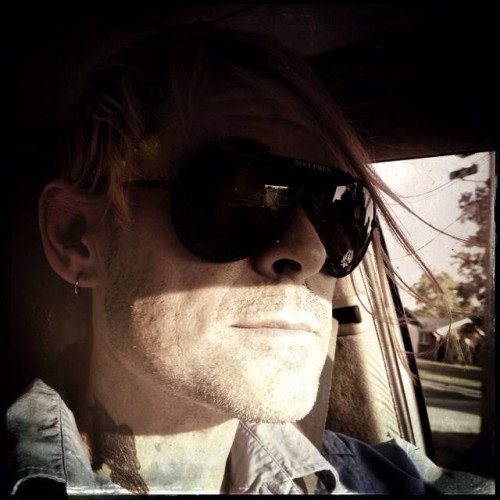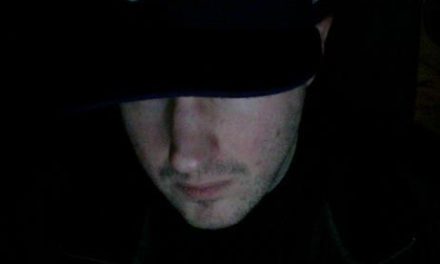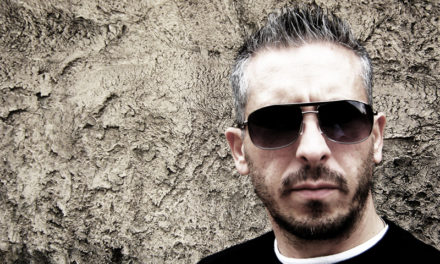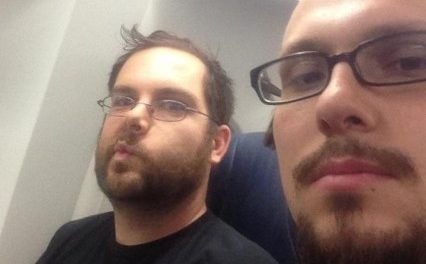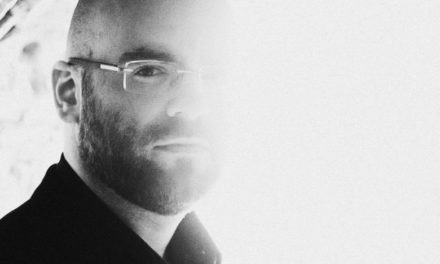“I would fight for all of us, but I would be the first one to walk away, if we won.”
Formed in 1991 by Steven Seibold, Hate Dept. has dealt in punk-infused electronic rock across five full-length releases, many of which became standard fare for the industrial rock movement. Formed partially out of distaste for the low energy of an average electronic music performance, Hate Dept.’s live shows became the stuff of legend, their on-stage antagonism and ruthless energy making them a staple live show experience. Then, after 2003’s DITCH, Seibold fell off the map for many, until resurfacing at the Cold Waves festival in 2012 to deliver a fan favorite performance. Finally, after a decade-long hiatus, the Hate Dept. Facebook page lit up with an announcement that their fifth studio album, New Ghost, would soon be available. It was self-released on Bandcamp on August 27th using the pay-what-you-want model. Seibold will be bringing Hate Dept. back onstage once again for the Cold Waves II music festival on Saturday, September 28th. We sat down with him to check in on what he’s been up to, what inspired the album, and what he sees in the future.
ID:UD: When last we spoke at Cold Waves, you had a blast talking about moving out to Indiana and farming for a living. How’s life on the farm?
Seibold: Kickass! Hell yeah, son! Woohoo! Well, I may have said that I am a farmer for a living; it sounds like something I would say. And I did move to rural Indiana with my wife, but I am not a farmer, yet. We are surrounded by farmland, which is not unusual in the mid-west. Having spent most of my life in Southern California, it’s still somewhat disorienting to see horse and buggy, corn stalks and combines bigger than our house. That answer will have to do. When I do become a farmer, I will harvest hate, as you’d expect.
ID:UD: It’s been ten years since DITCH. What have you been doing in the intervening years?
Seibold: I know I’ve said this already, but I’m sorry about the “10 years” thing. I released DITCH in 2003. There is no good excuse. Hate Dept. didn’t deserve that kind of abandonment. I hope to make up for it with New Ghost and whatever comes next. What else have I been doing? Moving from Southern California to the Appalachian Mountains of North Carolina, then to rural Indiana. Other music: Super Sport, Americlone, Deadache, Marinette and A Wild Nobility. Also, domestic animal rescue (outreach). Fixing old, neglected buildings. Building and nurturing other businesses with my wife, Michelle. Lastly, feeling guilty about avoiding Hate Dept. for so long…
“I’ve been very motivated to say something about my perception of fading individualism and tolerance of the “separate.”
ID:UD: Since it had been ten years since the last Hate Dept. album, I think New Ghosts took a lot of people by surprise when it came out. What made you decide it was time for a new album?
Seibold: Largely guilt and embarrassment. What an asshole for that part. I’m truly sorry about saying I would do something then delaying it to a point of humiliation. But I’ve been very motivated to say something about my perception of fading individualism and tolerance of the “separate.” Additionally, I was tremendously encouraged by the energy of David and Jason at Cold Waves last year. Equal to the amazing crowd participation was the closeness and positivity of the artists who performed. The loss is still deafening, but I believe Jamie is still feeding the energy that is healing us all.
ID:UD: On a few of the tracks from New Ghost, a handful of signature sounds from some EDM genres popped up, such as some dubstep wubbiness. Did you feel any pressure at all to make the sound on the album more modern, or did that get worked into it organically?
Seibold: Like a juvenile, I don’t respond to pressure. While I have heard dubstep, and know what it sounds like, I suck at fitting in. Also, I just Googled “EDM” to be sure it’s what I thought it was (whew). I don’t listen to music that fits into that genre. That’s not to say I don’t audition or reference it, because I do, but I don’t “enjoy” it. Terrible answer. I know I hear dub-step rhythmically more than sonically. Incorporating triplets in LFOs on bass synth patches with half time drum beats seemed cool, so I did 40 seconds worth. Think techno-Piñata with nothing inside.
ID:UD: One of Hate Dept.’s most enduring legacies is one of a great deal of acerbicism and aggression. Now that it’s been ten years, do you still feel like those emotions are easy to tap into?
Seibold: Yes, it’s who I am. Very short answer; I’m a separatist. I don’t believe in being governed by others, whether or not they share my ideals. I comply as a countryman, but resist as an individual. If that sounds scary, it should. I would fight for all of us, but I would be the first one to walk away, if we won.
ID:UD: As well as sourcing a big bunch of people to contribute to the chorus on “Broken Rule”, you’ve also assembled quite a community of new and familiar faces for the album. What can you tell us about the various contributors and how their involvement fit into the album as a whole?
Seibold: I have to start with the band itself; Nick Meade, Jae Stevens and Matthew Zeus Belcher are all amazing and uniquely talented. They reside in Fort Wayne, Indiana, the nearest “big city” to me. Nick really pushed himself to align with me on this record, and contributed incredible parts and bits of clatter that helped shape the sound of many songs. He played several instruments and made noises that have nothing to do with music, but everything to do with our conversations about sound. In 2010, I stared feeling more serious about making the record and reached out to all of the past generations of members who had toured with me for many years. Rob Robinson (Sergeant Sawtooth) and Charles Hunt (Sponge), both past members of Hate Dept., sent me tracks and concepts which either ended up being heavily used or considered as I worked. Johnny Bonnett of BlackCentr shared early sounds and vibes on tracks in development while I sang for his project.
Someone else I met, and saw myself in, was Mike Bradberry, a keyboardist-sound designer that continues to make waves as a performer wherever he’s invited. I dig his ambition and hunger for working in the artform. He’s not a “noise maker”. That might imply that I discarded something he sent because it was less than perfect. That didn’t happen. Then, I woke up one morning and wondered if anyone might want to sing on a record, like I have been so fortunate to. Sixty brave people sent in vocal performances. At least a dozen times, my eyes welled up with tears, either from the performance itself or the message that accompanied. But, for the record, I never cried. This is Hate Dept., we don’t do that.
“I was, and continue to be, comfortable with the possibility of sounding dated or irrelevant.”
ID:UD: The Cold Waves festival has contributed to a lot of discussion about if there’s a resurgence of classic American industrial rock. How did you feel about producing a very guitar-driven album and releasing it in this era of music?
Seibold: I alluded to not following electronic music above, it’s just the truth. I was so conflicted a few years ago about Hate Dept. and my own musical interests that I planned to make two versions of the band; one purely electronic and the other purely organic (guitar driven). At that time, my friend Jordan Davis (Common Man Down), politely told me that was a stupid idea that had nothing to do with Hate Dept. If he was my little brother, I would have given him a wedgie and told him to take it back. But, he was exactly right. The problem with the question is this: what is “industrial” rock? It tends to be a synonym for “unrecognized” or “past”. For those reasons, I stopped thinking about it. I briefly studied my past albums and started producing. I remember thinking, several times, that people who knew Hate Dept. of the past would appreciate the familiarity of what was happening. I was, and continue to be, comfortable with the possibility of sounding dated or irrelevant.
ID:UD: Do you have any plans for further albums? Has the response to the album been strong enough to encourage you to think about it?
Seibold: The response has been a big surprise. Many people have been very kind and supportive which is flattering beyond words. But, to answer the question directly, yes, the response has been the kind of thing that warrants another release. However, I’m hesitant to consider such a thing while I’m still coming to terms with the record I just released.
ID:UD: Outside of the music, you’ve also gotten quite a reputation as a great storyteller. Tell us your favorite story coming out of the album’s production.
Seibold: I’ll choose to believe that it’s the colorful way I see and express the small things that happen in my life, rather than having a uniquely rich existence. But sure, I can do this. As I stated above, I had sixty singers and ninety eight audio files, of those who participated in the chorus of ‘Broken Rule’. Several of the performances are children, young children, four, five, six years old. It was absolutely incredible to listen, and integrate them into the track. The sound of those little voices made the workload very enjoyable. Once I was organized and started mixing, I got the track sounding solid, then un-muted the lead-vocal, where the first line of the song is “Fuck this let’s destroy everything we’ve made”. I felt my face turn red, I hit “save” and went for bike ride.
Later that night, I skipped to the next song, thinking, “What the fuck am I going to do?” The moral weight of saying “Fuck” on the same song with a 5 year old was deep. A few days later, I was still conflicted, so I started considering an alternate lyric for the opening line. My wife Michelle was the right kind of supportive, playing the middle like a pro. In fact, I think she’s the one who told me to ask the parents. So, I wrote a polite letter asking the moms and dads what they thought about my dilemma, offering to change the words. To my surprise and pleasure, the parents assured me that it was their job to teach their children right from wrong, and, they knew what they were getting into when they sent the files. More than their co-operation and fundamental understanding of what I do, I appreciated that responsibility and commitment to “parenting”. I’m a big, “personal responsibility” guy, so I was charmed and impressed by their position. The “Fuck” flew out the speakers later that night. I fully expect a fat lip from the adult version of one of those amazing kids in about twenty years.
“I wanted Hate Dept. to feel as tough as the music sounded.”
ID:UD: One of your most enduring legacies as a musician is your presence as a live performer, and a lot has been said of your antagonistic call-and-response with your audience. How do you get pumped up for live shows these days, and how does that match up to when you were first starting out?
Seibold: I’m not sure I’ve ever really done much to “pump up” before a performance. In the early years, especially the first ten shows or so, much of the hostile stage presence was uncertainty. I wanted Hate Dept. to feel as tough as the music sounded. Because I’m not particularly “tough”, I was very nervous about “commanding” that presence. The early shows, in coffee shops and small, intimate venues, attendance was usually seated. People in chairs were easy targets for verbal assault. I locked into that “stride” because it felt natural and was polarizing. It was the right thing for Hate Dept. It still is today, but somewhat refined and more focused.
ID:UD: As things like the Wax Trax! Retrospectacle, Cold Waves, Fix: The Ministry Movie, and other showcases and artifacts of the heyday of American industrial have surfaced over the past few years, a lot of soul-searching has gone on with people looking back on experiencing that era. Now that enough time has passed by, how do you feel about that era when you look back on it?
Seibold: I look back on that era with the same romantic appreciation I did then. However, I’m not a loyal fan, personally. When I adore music, I adore the artist for creating it. If their future art doesn’t dazzle me, I spare them from having to meet my expectation, by not having any. The recent “nostalgia concert” events are a funny thing. They must inspire many artists involved to create and release new music, as well as stimulate fans of the sound to hear more from their favorite bands. This is a delicate matter. As fans and artists we must accept that not every creator or listener wants to hear an evolution. Much of the significance in a romance, is the time and space is occupies. I still blast What’s This For? by Killing Joke. It still makes the hair on my arms stand up, but I can’t really say why. It makes my wife and dogs leave the room hastily and annoyed.
ID:UD: Where do you personally see Hate Dept.’s creative output fitting into that era?
Seibold: Yikes. Well, I’d like to think Hate Dept. was a significant cog in the wheel that was the Wax Trax/Nettwerk/Nothing era, but it just isn’t true. We stood under the ledge of success, not on it. I feel very grateful that we were able release records and tour, and more importantly, hold on to kind and open minded fans. But, the truth is, we were not able to harness commercial or “underground” success to continue making music in the framework of the “music industry”. At least the one we all knew and loved/hated.
ID:UD: Finally, what are you most excited about for Cold Waves II?
Seibold: The people; audience, artists, crew, staff, interaction, conversation. connections, hugs, hand-shakes, reminiscing, laughs, tears and memories. The rest is just noise.
Hate Dept. will be performing at the Cold Waves II Festival on August 27th/28th in Chicago. New Ghost is available now digitally and on CD via Bandcamp.

